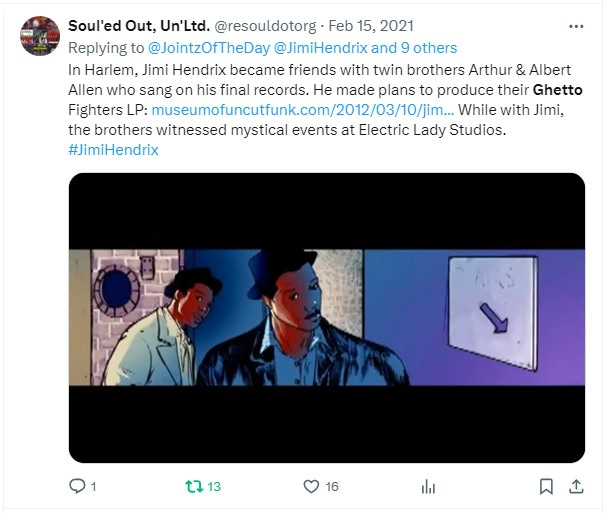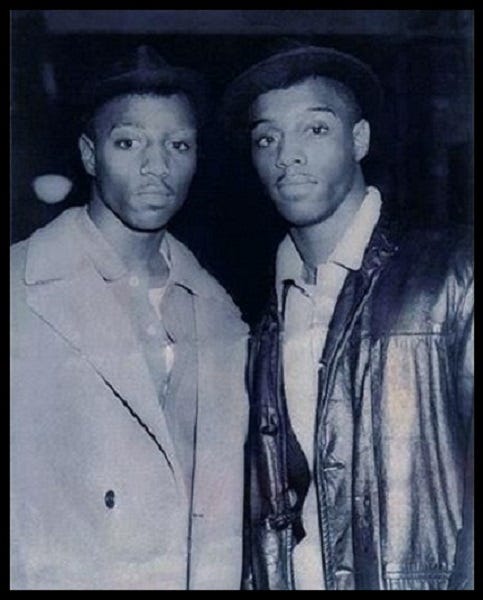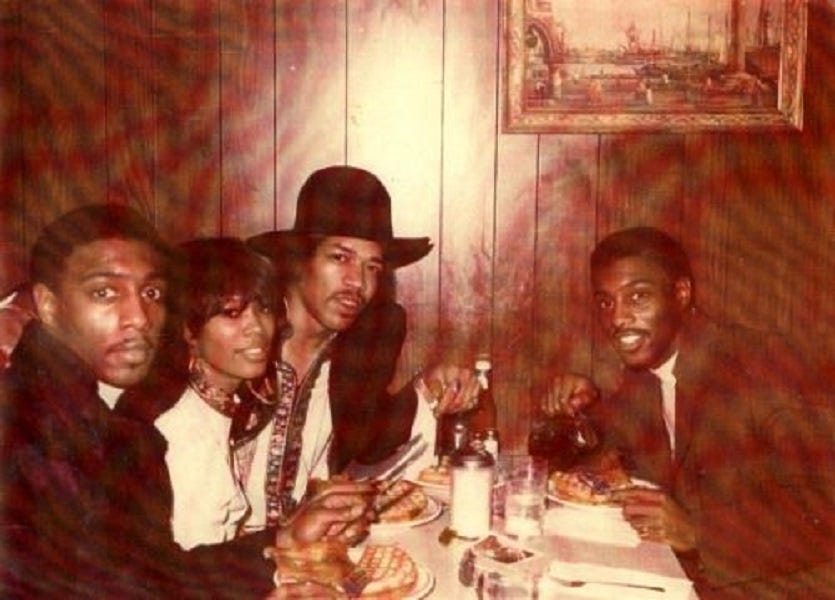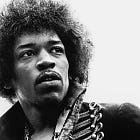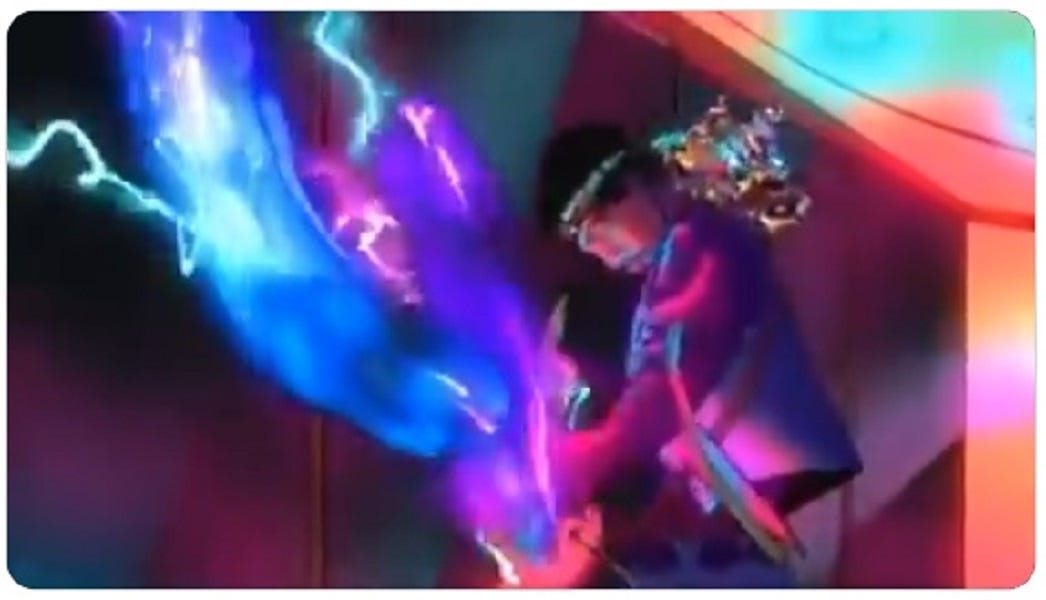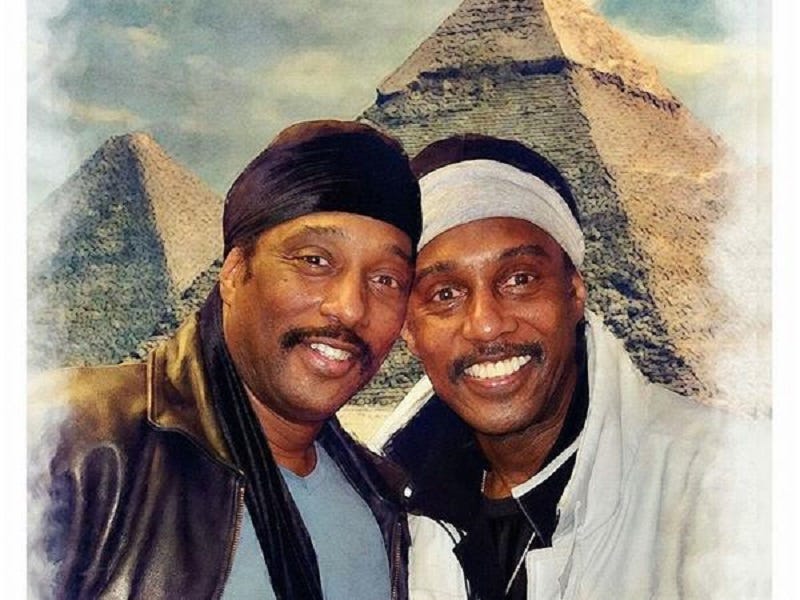TaharQa and Tunde' Ra Aleem (born February 14, 1946) – Hooked On Your Love (1979)
This dancefloor classic by Aleem aka the Allen Twins featured Leroy Burgess and Luther Vandross on vocals and became a Larry Levan fave at the Paradise Garage.
Watch video on Twitter
View most updated version of this post on Substack
Search our full archives
TaharQa Z. and the late Tunde’ Ra Aleem (February 14, 1946 - August 14, 2014), previously known as Albert and Arthur Allen, are twin brothers who collaborated with Jimi Hendrix as the Ghetto Fighters. In the late 1970s they formed their own label Nia Records and began releasing material as Aleem aka The Fantastic Aleems, featuring Leroy Burgess on vocals.
Twin brothers Albert and Arthur Allen were born in Harlem, New York City. They spent many afternoons at the Apollo Theatre growing up, and joined various vocal groups. Arthur was a member of the International G.T.O.’s, who were given a record contract by Harlem gangster Jack “Fat Man” Taylor, owner of Rojac Records. In 1966 the group released their sole single, the superb upbeat jam “I Love My Baby” b/w “It’s Been Raining In My Heart.”
The group changed their name to The Master Four and in 1967 released another two singles on Taylor’s Tay-Ster Records. One was “Love From the Far East” b/w the beautiful slow jam “It's Not The End,” which was actually recorded in 1962 and co-written by lead singer Tommy Lockhart and Arthur Allen. In 2019, Lockhart shed light on its origins:
“‘It's Not The End’ was recorded two days before Thanksgiving in 1962. I co-wrote it with Arthur Allen when he came up with the idea when we worked at HARYOU-ACT (Harlem Youth Opportunities Unlimited-Associated Community Teams) in the early 60's. The song was recorded with the vocals and instruments at the same time and the recording was over within 10 minutes. No overdubs or voices added. It was in and out of Bell Recording Studio and still time to get home for dinner.”
They backed Big Maybelle (although uncredited) on “It’s Been Raining” in 1969, and were credited as the Master Three on Wesley Paige’s “I've Got To Find Out For Myself” b/w the inspirational “Better Days Are Coming,” both released on Rojac.
While Arthur was recording for Taylor the twins met Clarence “Blowfly” Reid, who at the time was an in-house writer and producer for Rojac. Taylor also introduced them to Lithofayne (Faye) Pridgeon, one of Jimi Hendrix’s girlfriends when he was living in Harlem in the mid-sixties before moving to London and becoming a superstar.
Faye enlisted them in a scheme to evict Hendrix from the apartment where he had been crashing, which belonged to her friend June Vasquenza. Arthur was supposed to marry June, an undocumented Mexican immigrant, forcing Hendrix to move. But when they met Jimi, the twins abandoned the plan and became fast friends with him thanks to their shared love of music.
The Allen twins with Hendrix and Faye Pridgeon, New York City, 1968.
After the Jimi Hendrix Experience took off and Hendrix became the biggest solo rock star of the late sixties, he returned to New York and constructed Electric Lady Studios. He named the twins the Ghetto Fighters, and had plans to produce their debut album, which he envisioned as a “street opera.” They sang backing vocals on several songs he was working on with his post-Experience lineup of drummer Mitch Mitchell and bassist Billy Cox. One of them was “Freedom,” the opening cut and lead single from The Cry of Love (1971), the first posthumous album released after Hendrix’s suspicious death.
“Freedom” also featured Juma Sultan on percussion and congas, who was part of the lineup that played with Hendrix at Woodstock.
As the song closed, the twins chanted “Keep on pushin’! Straight ahead!,” and Hendrix used “Straight Ahead” as the title to another song he recorded in the months before his death, also included on The Cry of Love, with his most overtly political lyrics yet:
“We gotta stand side by side, We gotta stand together and organize / Power to the people, that's what I'm screaming, freedom of the soul / Pass it on, pass it on to the young and old / You gotta tell the children the truth, they don't need a whole lotta lies / Because one of these days baby, they'll be running things / So when you give them love you better give it right”
Albert and Arthur organized a benefit concert for Harlem’s United Block Association (UBA) that took place on September 5, 1969. It featured artists including Big Maybelle, and Love, Togetherness, and Devotion (L.T.D.), headlined by Hendrix and his Woodstock lineup (Gypsy, Sun and Rainbows).
That same year, the twins recorded several songs including “Mojo Man” at FAME Studios in Muscle Shoals, Alabama. In August, 1970, Hendrix overdubbed his lead and rhythm guitar onto some of their tracks. Sadly, his death the following month halted the Ghetto Fighters album project.
While recording with Hendrix, Albert claimed they witnessed mystical events at Electric Lady Studios. This claim may have been fictional, and simply one of the vignettes from their planned street opera. On the twins’ own website, they stated, “We make no concessions to rational notions of plausibility, nor do we apologize for seeming flights of fancy.” It could have just been a really strong acid trip. But in light of the power of Hendrix’s music, it is worth keeping an open mind while viewing the animated short TaharQa narrated circa 2018 that revealed what they supposedly saw nearly five decades earlier.
In 1972 they changed their name to US, then to Prana People, and former New York Knicks star-turned label owner Earl “The Pearl” Monroe began managing them. They released one self-titled album on Prelude Records in 1977, produced by Wade Marcus, with all songs co-written by the twins (then known as Talib and Zayeed Aleem). It opened with the disco-funk workout “Pranian Man.” Other standout cuts included the funky “Wishful Thinking” and the epic jam “Angels Say Flee.” Original copies today sell for $100 and up on Discogs.
They borrowed $1500 from their father in 1979 and used it to start their own record label, Nia Records. Its first release was the slamming disco-funk jam “Hooked On Your Love,” which the twins co-wrote and co-produced. During production they hired former Black Ivory lead singer Leroy Burgess to play keyboards and arrange the track, but he took over lead vocals (billed as “Caliber”) after TaharQa was dissatisfied with how his own vocals turned out. Backing vocalists were Jocelyn Brown, Crystal Davis, and a still-unknown Luther Vandross. The result was a dancefloor classic.
One bystander recalled the scene when copies first hit the street:
“I was there at Rock & Soul on 36th in NYC when the Aleems pulled out the box with the first pressing 12 inches of “Hooked On Your Love” outta the trunk of their car for the store...I snatched that right up for sure.”
The track spent four months on the national disco charts, peaking at #15, and was played relentlessly by DJ Larry Levan at the Paradise Garage. The following year in 1980 it was re-released with a phenomenal remix by John Morales.
Other releases on Nia included the booty shaking anthem “Shake” (1980) by Alias; A High Frequency’s Summertime” (1980), which again featured Burgess on lead vocals and was co-produced by him and the twins and mixed by Rick Gianatos; and “Get Down Friday Night” (1982) by The Fantastic Aleems, with Burgess on lead vocals, mixed by John Morales and Sergio Munzibai.
The label’s releases were initially the twins’ own productions under the names of different studio groups. But as the hip hop era dawned, they met many up and coming artists at “Fat Man” Taylor’s iconic club Harlem World, which operated from 1975-1985 at 101 W 116th St on the Upper West Side. Nia eventually released early hip hop classics by Captain Rock and Marley Marl featuring MC Shan.
In 1984 the Aleems co-wrote and co-produced the electro classic “Release Yourself,” featuring Burgess on lead vocals (although he was uncredited on many copies) and co-mixed by Marley Marl. It became a favorite record of Levan’s during the final years of the Garage.
Happy Birthday to the great TaharQa Z. Aleem, and Rest In Power Tunde’ Ra.
Further info:
“Jimi Hendrix & The Ghetto Fighters – Mojo Man,” Museum of Uncut Funk, March 10, 2012.
"The Aleem Brothers Interview - Parts 1 and 2," Museum of UnCut Funk, May 29, 2012.
“Celebrating the physical life of Tunde' Ra Aleem,” New York Amsterdam News, September 11, 2014.
“The Source Celebrates The Extraordinary Life Of Tunde' Ra Aleem,” The Source, September 15, 2014.
Jimi Hendrix & The Ghettofighters: in Harlem World, by TaharQa Aleem and Tunde' Ra Aleem, Amazon Books, October, 2014.
#soul #funk #GhettoFighters #JimiHendrix #LeroyBurgess #Aleem


